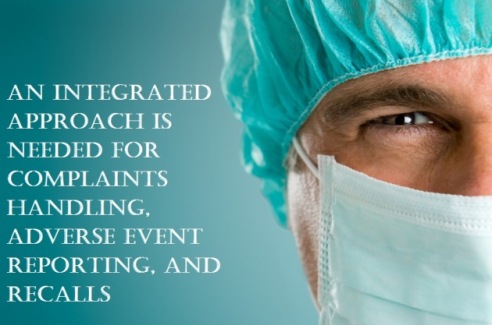An integrated approach is needed for Complaints Handling, Adverse Event Reporting, and Recalls

The fact that medical device manufacturers work and operate in various regulatory systems whose requirements are different and not always consistent with each other is recognized and empathized by the new ISO version, the ISO 13485:2016. Because of the divergence in the requirements of each regulatory system; manufacturers are required to identify their roles, as well as the regulatory requirements for that role, and then incorporate them into their Quality Management System.
When it comes to post-market device issues; the various jurisdictions, however, deal with these in different ways. Three interlocking, interrelated processes need to go into the QMS:
- Complaint management
- Adverse event reporting
- Recalls
A complete learning on how to implement an integrated QMS

A highly educative and valuable learning session on these primary and secondary QMS processes and the way they need to be understood and implemented vis-à-vis the US, EU, and Canadian regulations is being organized by GlobalCompliancePanel, a leading provider of professional trainings for all the areas of regulatory compliance.
The Director of this two-day seminar is Dan O’Leary, who is President of Ombu Enterprises, LLC, a company offering training and execution in Operational Excellence, which focuses on analytic skills and a systems approach to operations management. Dan brings more than 30 years’ experience in quality, operations, and program management in regulated industries including aviation, defense, medical devices, and clinical labs.
To understand the way in which to implement an integrated QMS in which the various aspects of complaints, adverse reporting and recalls are built; please register for this seminar by visiting An integrated approach is needed for Complaints Handling, Adverse Event Reporting, and Recalls This seminar has been pre-approved by RAPS as eligible for up to 12 credits towards a participant’s RAC recertification upon full completion.
Alignment with the FDA’s QMS is a major point

One of the highlights of the final version of the ISO 13485:2016 standard, which has now become available, is the extent of its alignment with the FDA’s Quality Management System (QMS) requirement. Although the degree of alignment set out in 2016 version of 13485 is significantly higher than that of the previous version of 2003; there still do exist a few points at which it deviates from the FDA’s QMS. Companies that are required to comply with this standard have to keep this in mind.
Now that the ISO 13485:2016, the Medical Device Single Audit Program (MDSAP), and the new EU Medical Device Regulation have been introduced; companies need to update their QMS and integrate all of the elements if their implementation has to be effective and compliant. At this two-day session, Dan will provide the tools that the participants will need for this.

The agenda of this learning session will be the following:
- The Regulatory Structure
- FDA QSR
- ISO 13485:2016 and regional variants
- ISO 14971:2007 and regional variants
- Implementing MDSAP
- The EU Medical Device Regulation
- Servicing
- Identification of problems
- Servicing data analysis
- Input to the complaint process
- Complaints
- Evaluating complaints
- Investigating complaints
- Complaint data analysis
- Input to the corrective action process
- Input to the risk management process
- Corrective Action
- Developing the process
- Analyzing product and process information
- Determining subsequent actions
- Input to the design process
- Input to the risk management process
- Design and Design Changes
- Determining the need for a design change
- Documenting design changes
- Design change verification and validation
- Input to the risk management process
- Input to the pre-market submission process
- Risk Management
- ISO 14971:2007 and regional variants
- Incorporating post-market information
- Updating Pre-market Submissions
- US – The 510(k) guidance
- EU – Technical files and design dossiers
- Canada – License changes
- Adverse Event Reporting
- US – MDR
- EU – Vigilance Reports
- Canada – Mandatory Problem Reporting
- Recalls
- US – Corrections and Removals
- EU – Field Safety Corrective Actions
- Canada – Recall.
Labels: medical device manufacturers, regulatory, regulatory body requirements, regulatory requirements for clinical trials, regulatory requirements medical devices

0 Comments:
Post a Comment
Subscribe to Post Comments [Atom]
<< Home